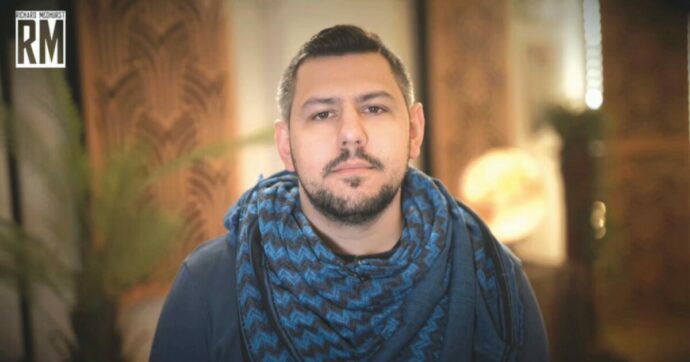British journalist could face years in prison for refusing to hand over his passwords to the police

It is an unprecedented case. And it risks triggering an unprecedented threat to journalism. The UK police have repeatedly tried to obtain the passwords to the phones of the British independent journalist, Richard Medhurst, the first reporter arrested in London under Section 12: his analyses and comments on Israel’s bloodbath in Gaza – which Amnesty International has characterised as genocide – have been interpreted by the police as support for organisations banned from the UK, such as Hamas and Hezbollah.
The son of two UN peacekeepers, Medhurst was arrested last August at London’s Heathrow Airport: as soon as he landed, he was taken off the by six police officers. In an interview with Il Fatto Quotidiano, Medhurst said that he was on his way to the Beautiful Days Festival, where he was supposed to speak with former British ambassador Craig Murray and British rapper Lowkey. Detained for almost a full day, interrogated for two hours, his two phones, headphones, cables, microphones, sim cards seized. Since then Richard Medhurst has been under investigation for terrorism, if he is indicted and convicted under Section 12, he faces fourteen years in prison.
The British journalists’ union, the NUJ, and the International Federation of Journalists (IFJ) publicly condemned his arrest and the use of anti-terrorism laws against journalists “simply for carrying out their work”.
Richard Medhurst was carrying an iPhone and a Google Pixel with a Graphene operating system, which is privacy-focused and considered particularly secure. He refuses to hand over passwords because, like all reporters’ phones, they contain information that could identify his sources. Often for a journalist, handing over passwords to the police means handing over the names and contacts of his sources. The right to protect them is recognised for every reporter in the free world and confirmed by many rulings of the European Court of Human Rights, because if we journalists do not protect those who talk to us confidentially, no one will talk to us confidentially any more.
Experts consulted by Il Fatto Quotidiano, such as Steven Murdoch, professor of security engineering at University College London, believe that, based on publicly available information as of last July, the police have no chance of extracting the information from the Graphene operating system phone, using the well-known technology of the Israeli company Cellebrite. And with others? Murdoch cites MSAB’s XRY software : “Less is publicly known about XRY so it is difficult to say whether it would have allowed the police to extract data”.
The British authorities could also appeal to the court and get a judge to order the reporter to hand them over. If Richard Medhurst fails to do so, he faces between two and five years in prison. Il Fatto Quotidiano tried to find out if there are other cases in western democracies where journalists risk prison if they do not hand over their passwords. Unfortunately, neither the International Federation of Journalists nor Reporters Sans Frontières (RSF) have statistics on this. But Rebecca Vincent, who heads RSF’s campaigns, has no doubts: “We have tracked case of authorities forcing journalists to disclose passwords or otherwise interfering with their devices in every region of the world, from western democracies to more authoritarian regimes”, she tells to our newspaper, “the impact is the same: at best intimidates journalists working on sensitive topics, and at worst it compromises the protection of journalistic sources”.
The British police do not dispute that Medhurst is a journalist and that the seized phones are tools used in the journalistic profession, the problem is that they nevertheless demand access to the data in a procedure like this: the reporter reveals passwords, the information contained in the phones is placed in the hands of an ‘independent’ police officer or lawyer, who are charged with sifting through them and deciding which are to be protected by journalist-source confidentiality and which are not. Basically a way of serving sensitive information to the British government on a silver platter. If the British authorities prevail, no journalist travelling to London will be safe.
ITALIAN VERSION – Rischia il carcere a Londra perché tutela le sue fonti

